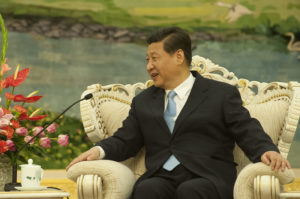
Secretary of Defense Leon E. Panetta meets with Chinese Vice President Xi Jinping prior to a meeting in Beijing China, Sept. 19, 2012. Panetta visited Tokyo, Japan before continuing to Beijing and traveling to Auckland, New Zealand on a week long trip to the Pacific. DoD photo by Erin A. Kirk-Cuomo
The WSJ outlines below how Chinese President Xi is forcing more state control of Chinese businesses.
This is being done today under the auspices of helping the party, but having more state-owned enterprises or quasi-state controlled enterprises does not create a level playing field. China doesn’t view business the same way Western firms do.
The private sector and the public sector are partners in China. No profit-motivated Western business lacking the implicit backing of its national government can compete with Chinese businesses that get or will get that kind of support.
It’s time for the western world to cut trading ties with China. Phase-out imports and phase out exports. Western company intellectual property is, or will be, a public good in China. That should be obvious to anybody reading between the lines here.
Lingling Wei reports in The Wall Street Journal:
Xi Jinping, long distrustful of the private sector, is moving assertively to bring it to heel.
China’s most powerful leader in a generation wants even greater state control in the world’s second-largest economy, with private firms of all sizes expected to fall in line. The government is installing more Communist Party officials inside private firms, starving some of credit and demanding executives tailor their businesses to achieve state goals.
In some cases, it is taking charge entirely of companies it regards as undisciplined, absorbing them into state-owned enterprises.
The push is driven by a deepening conviction within the country’s leadership that markets and private entrepreneurs, while important to China’s rise, are unpredictable and not to be fully trusted. The view that state planners are better at running a complex economy has gained currency this year, with Beijing relying heavily on state directives to engineer a V-shaped recovery from the shock of Covid-19.
Mr. Xi has made his priorities especially clear in recent months. In September, the party issued new guidelines for private companies, reminding them to serve the state and vowing to use education and other tools to “continuously enhance the political consensus of private business people under the leadership of the party.”
Just a few weeks later, Mr. Xi personally intervened to block the $34 billion initial public offering of one of China’s biggest private firms, Ant Group, partly out of concerns it was too focused on its own profits rather than the state’s goal of controlling financial risk.
The message isn’t lost on entrepreneurs, who are reorienting their businesses to appease the state or giving up on private enterprise altogether.
“For us small businesses, we have no choice but to follow the party,” says Li Jun, a 50-year-old owner of a fish-farming business in the eastern Jiangsu province. “Even so, we’re not benefiting at all from government policies.”
Read more here.
